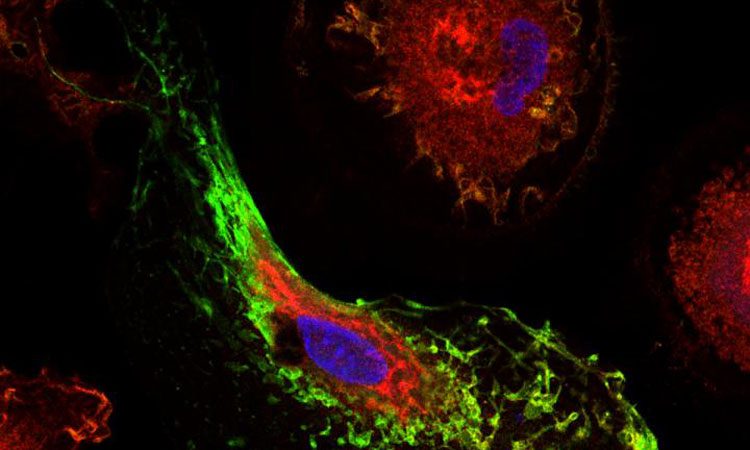Genes linked to Alzheimer’s risk have been identified
Posted: 15 August 2019 | Nic Losardo (Drug Target Review) | No comments yet
Two genes that influence risk Alzheimer’s disease could provide scientists with new targets for delaying the onset of the condition’s symptoms.


A team led by researchers at Washington University School of Medicine has identified a pair of genes that influence risk for Alzheimer's disease. The genes (MS4A4A and TREM2) affect the brain's immune cells. They influence Alzheimer's risk by altering levels of TREM2, a protein (shown stained in red) that is believed to help microglia cells clear excessive amounts of the Alzheimer's proteins amyloid and tau from the brain. The MS4A4A protein is shown stained in green (credit: Fabia Filipello and Dennis Oakley).
Researchers have identified a pair of genes that influence risk for both late-onset and early-onset Alzheimer’s disease which could provide scientists with new targets and a strategy for delaying the onset of Alzheimer’s symptoms.
The study, led by scientists at Washington University School of Medicine in St Louis have stated that the genes (known as MS4A4A and TREM2) operate in the microglia, the brain’s immune cells. They influence Alzheimer’s risk by altering levels of TREM2, a protein that is believed to help microglia cells clear excessive amounts of the Alzheimer’s proteins amyloid and tau from the brain.
“If we can do something to raise levels of the TREM2 protein in the cerebrospinal fluid, we may be able to protect against Alzheimer’s disease or slow its development,” said co-senior investigator Carlos Cruchaga, PhD, a professor of psychiatry and director of the NeuroGenomics and Informatics Group.
Researchers measured soluble TREM2 levels in the cerebrospinal fluid of 813 older adults in the study – 172 had Alzheimer’s disease, 169 were cognitively normal and another 183 had early mild cognitive impairment. They also analysed the participants’ DNA, conducting genome-wide association studies to look for regions of the genome that may influence TREM2 levels in the cerebrospinal fluid.
“We observed TREM2 risk variants more often in people who had Alzheimer’s or were mildly cognitively impaired, compared with those who were cognitively normal,” added co-senior investigator Celeste Karch, PhD, an assistant professor in the Department of Psychiatry. “It turns out that about 30 percent of the population in the study had variations in the MS4A4A gene that appear to affect their risk for developing Alzheimer’s disease. Some variants protected people from Alzheimer’s or made them more resilient while others increased their risk.”
We observed TREM2 risk variants more often in people who had Alzheimer’s or were mildly cognitively impaired”
The researchers noted that variants in the MS4A4A gene cluster linked to an increase in risk for developing Alzheimer’s disease are associated with lower levels of soluble TREM2 protein. The other variant, associated with higher levels of TREM2 in the cerebrospinal fluid, seemed to protect against Alzheimer’s.
“These findings give us a new therapeutic strategy to pursue, one focusing not only on neurons but on how the microglia may be involved in helping to clear damaging proteins, such as beta amyloid and tau, that are linked to Alzheimer’s disease,” concluded co-senior author, Bruno A Benitez, MD, an assistant professor of psychiatry.
The study was published in the journal Science Translational Medicine.
Related topics
Analysis, Clinical Trials, Disease Research, Genomics, Protein, Research & Development, Targets
Related conditions
Alzheimer’s disease
Related organisations
Washington University School of Medicine
Related people
Bruno A Benitez MD, Carlos Cruchaga PhD, Celeste Karch PhD








